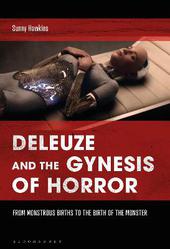
|
Deleuze and the Gynesis of Horror: From Monstrous Births to the Birth of the Monster
Hardback
Main Details
| Title |
Deleuze and the Gynesis of Horror: From Monstrous Births to the Birth of the Monster
|
| Authors and Contributors |
By (author) Sunny Hawkins
|
| Physical Properties |
| Format:Hardback | | Pages:208 | | Dimensions(mm): Height 229,Width 152 |
|
| Category/Genre | Film theory and criticism |
|---|
| ISBN/Barcode |
9781501358456
|
| Classifications | Dewey:791.436164 |
|---|
| Audience | | Tertiary Education (US: College) | |
|---|
|
Publishing Details |
| Publisher |
Bloomsbury Publishing Plc
|
| Imprint |
Bloomsbury Academic USA
|
| Publication Date |
1 October 2020 |
| Publication Country |
United States
|
Description
Applying Deleuze's schizoanalytic techniques to film theory, Deleuze and the Gynesis of Horror demonstrates how an embodied approach to horror film analysis can help us understand how film affects its viewers and distinguish those films which reify static, hegemonic, "molar" beings from those which prompt fluid, nonbinary, "molecular" becomings. It does so by analyzing the politics of reproduction in contemporary films such as Ex Machina; Mary Shelley's Frankenstein; Mad Max: Fury Road; the Twilight saga; and the original Alien quadrilogy and its more recent prequels, Prometheus and Alien: Covenant. Author Sunny Hawkins argues that films which promote a "monstrous philosophy" of qualitative, affirmative difference as difference-in-itself, and which tend to be more molecular than molar in their expressions, can help us trace a "line of flight" from the gender binary in the real world. Deleuze and the Gynesis of Horror demonstrates how the techniques of horror film - editing, sound and visual effects, lighting and colour, camera movement - work in tandem with a film's content to affect the viewer's body in ways that disrupt the sense of self as a whole, unified subject with a stable, monolithic identity and, in some cases, can serve to breakdown the binary between self/Other, as we come to realize that we are none of us static, categorizable beings but are, as Henri Bergson said, "living things constantly becoming."
Author Biography
Sunny Hawkins is the Director of Peer Tutoring and Writing Across the Curriculum at Butler University in Indianapolis, USA, where she teaches seminars on Gender and Horror Film. She holds a PhD in English from Southern Illinois University Carbondale and has served as an Associate Professor of English at the University of Southern Indiana and Texas A&M University-Kingsville, USA. Her work on horror film has appeared in the interdisciplinary journal Reconstruction.
ReviewsThis is a cutting-edge, truly significant work. In her unique and compelling application of Deleuzian "schizosophy" to modern horror, Hawkins claims to "push the embodied unthinking of the gender binary further in the field of feminist film theory, for the sake of both film theory and feminism itself," and indeed she does. Hawkins reminds us that we are "misshapen, half-formed creatures, full of desire," and convinces us that we need not experience that as a negative thing but rather as the beginning of our liberation from the repressive molar-ized world of modernity. Truly a triumph! * Kimberly Jackson, Professor of English, Florida Gulf Coast University, USA * Situating her work on motherhood in the "interstitial" current moment when gender roles have been complicated and troubled but with no alternatives as yet articulated, Sunny Hawkins employs Deleuzian schizoanalysis to examine motherhood in horror films. Her work is provocative and useful for film and gender scholars, and her readings of specific films such as Alien, Frankenstein, Twilight, and Underworld give them new life. * Ann C. Hall, Professor and Chair of the Department of Comparative Humanities, University of Louisville, USA * Sunny Hawkins' excellent book is a valuable addition to the growing areas of Deleuze and feminist film theory and Deleuze and the horror film. Deleuze and the Gynesis of Horror returns to some important feminist critiques of the concepts of Woman, the feminine and sexual difference and recasts them using Deleuze's nonbinary understanding of difference. Hawkins' discerning and nuanced schizoanalytic readings of sexual difference, motherhood and the feminine in the horror film bring to life affective, molecular and rhizomatic film viewing experiences. * Teresa Rizzo, Academic Coordinator, SAE Qantm: Creative Media Institute, Australia *
|